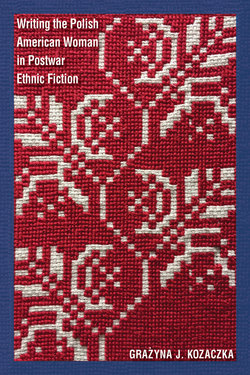Читать книгу Writing the Polish American Woman in Postwar Ethnic Fiction - Grażyna J. Kozaczka - Страница 10
На сайте Литреса книга снята с продажи.
ОглавлениеSeries Editor’s Preface
Although the Polish American ethnic group may not have produced as much women’s fiction, in English, nor supported as large a number of woman writers as some other ethnic groups in the United States, Polish American women’s literature nonetheless has a long tradition in North America. In Something of My Very Own to Say: American Women Writers of Polish Descent (East European Monographs, 1997), coeditors Thomas S. and Rita Holmes Gladsky introduced and explored the work of select exemplars of this genre in a collection of scholarly essays and literary excerpts spanning the late nineteenth though the twentieth century. Karen Majewski’s Traitors and True Poles: Narrating a Polish-American Identity, 1880–1939 (Ohio University Press, 2003) later examined the very early literature by Polish American female authors, much of it written in Polish and a lot of it serialized in the immigrant Polish-language press, amply demonstrating the breadth and depth of this literary tradition. The third volume in the Polish and Polish-American Studies Series, Majewski’s book has become a classic in the canon of ethnic literary criticism.
Writing the Polish American Woman in Postwar Ethnic Fiction by Grażyna J. Kozaczka, professor of English at Cazenovia College in New York, now takes the investigation of this subject from the mid-twentieth century to recent and contemporary times. Professor Kozaczka shows the enduring importance of patriarchy in the experience of Polish American women and their often quiet, sometimes even secret efforts to fashion an independent sphere of thought and action for themselves and their daughters. In doing so, these women writers demonstrate that ethnicity has been a gendered concept and that men and women understand and experience, construct and perform group belonging and ethnic identity in different, gendered ways. Looking at the long development of Polish American women’s fiction in North America, Kozaczka charts a significant change over time in the way Polish American women writers work out an ethnic identity for themselves. Once deeply rooted in their local communities, their social connections, and broader historical processes, in more recent times ethnic identity has become a deeply personal, individualized part of the unique experiences that shape each Polish American woman’s life.
Publication of the Ohio University Press Polish and Polish-American Studies Series marks a milestone in the maturation of the Polish Studies field and stands as a fitting tribute to the scholars and organizations whose efforts have brought it to fruition. Supported by a series advisory board of accomplished Polonists and Polish Americanists, the Polish and Polish-American Studies Series has been made possible through generous financial assistance from the Polish American Historical Association, the Stanislaus A. Blejwas Endowed Chair in Polish and Polish American Studies at Central Connecticut State University, the Polish Institute of Arts and Sciences of America, and the Frank and Mary Padzieski Endowed Professorship in Polish/Polish American/Eastern European Studies at the University of Michigan, Dearborn, and through institutional support from Wayne State University and Ohio University Press. The series, meanwhile, has benefited from the warm encouragement of a number of other persons, including Gillian Berchowitz, M. B. B. Biskupski, Robert Blobaum, the late Stanislaus A. Blejwas, Thomas Duszak, Mary Erdmans, Martin Hershock, Rick Huard, Anna Jaroszyńska-Kirchmann, Grażyna Kozaczka, Anna Mazurkiewicz, Brian McCook, Anna Müller, Thomas Napierkowski, James S. Pula, and the late Thaddeus Radzilowski, and from the able assistance of the staff of Ohio University Press. The series also has received generous assistance from a growing list of series supporters, including benefactor Thomas Duszak, contributor George Bobinski, and additional friends of the series including Alfred Bialobrzeski, William Galush, John A. and Pauline A. Garstka, Jonathan Huener, Grażyna Kozaczka, Neal Pease, Maria Swiecicka-Ziemianek, and Mary Jane Urbanowicz. The moral and material support from all of these institutions and individuals is gratefully acknowledged.
John J. Bukowczyk
